- Home
- Jr. Horatio Alger
Luke Walton Page 2
Luke Walton Read online
Page 2
Mrs. Walton shook her head. It was not from her that Luke hadinherited his independent spirit. She was a fond mother, of greatamiability, but of a timid shrinking disposition, which led her todeprecate any aggressive steps.
"Promise me not to get yourself into any trouble, Luke," she said,"even if you do meet this man."
"I can't promise that, mother, for I may not be able to help it.Besides, I haven't met him yet, and it isn't necessary to cross abridge till you get to it. Now let us talk of something else."
"How much did you make to-day, Luke?" asked Bennie, his young brother,seven years old.
"I didn't make my fortune, Bennie. Including the morning papers, Ionly made sixty cents."
"That seems a good deal to me, Luke," said his mother. "I only madetwenty-five. They pay such small prices for making shirts."
"I should think they did. And yet you worked harder and more steadilythan I did."
"I have worked since morning, probably about eight hours."
"Then you have made only three cents an hour. What a shame!"
"If I had a sewing-machine, I could do more, but that is beyond ourmeans."
"I hope soon to be able to get you one, mother. I can pay somethingdown and the rest on installments."
"That would be quite a relief, Luke."
"If you had a sewing-machine, perhaps I could help you," suggestedBennie.
"I should hardly dare to let you try, Bennie. Suppose you spoiled ashirt. It would take off two days' earnings. But I'll tell you whatyou can do. You can set the table and wash the dishes, and relieve mein that way."
"Or you might take in washing," said Luke, with a laugh. "That paysbetter than sewing. Just imagine how nice it would look in anadvertisement in the daily papers: A boy of seven is prepared to washand iron for responsible parties. Address Bennie Walton, No. 161-1/2Green Street."
"Now you are laughing at me, Luke," said Bennie, pouting. "Why don'tyou let me go out with you and sell papers?"
"I hope, Bennie," said Luke, gravely, "you will never have to go intothe street with papers. I know what it is, and how poor boys fare. Onenight last week, at the corner of Monroe and Clark Streets, I saw apoor little chap, no older than you, selling papers at eleven o'clock.He had a dozen papers which he was likely to have left on his hands,for there are not many who will buy papers at that hour."
"Did you speak to him, Luke?" asked Benny, interested.
"Yes; I told him he ought to go home. But he said that if he went homewith all those papers unsold, his stepfather would whip him. Therewere tears in the poor boy's eyes as he spoke."
"What did you do, Luke?"
"I'll tell you what I did, Bennie. I thought of you, and I paid himthe cost price on his papers. It wasn't much, for they were all pennypapers, but the poor little fellow seemed so relieved."
"Did you sell them yourself, Luke?"
"I sold four of them. I went over to Madison Street, and stood infront of McVicker's Theater just as the people were coming out. It sohappened that four persons bought papers, so I was only two cents out,after all. You remember, mother, that was the evening I got home solate."
"Yes, Luke, I felt worried about you. But you did right. I am alwaysglad to have you help those who are worse off than we are. Howterribly I should feel if Bennie had to be out late in the streetslike that!"
"There are many newsboys as young, or at any rate not much older. Ihave sometimes seen gentlemen, handsomely dressed, and evidently withplenty of money, speak roughly to these young boys. It always makes meindignant. Why should they have so easy a time, while there are somany who don't know where their next meal is coming from? Why, whatsuch a man spends for his meals in a single day would support a poornewsboy in comfort for a week."
"My dear Luke, this is a problem that has puzzled older and wiserheads than yours. There must always be poor people, but those who aremore fortunate ought at least to give them sympathy. It is the leastacknowledgment they can make for their own more favored lot."
"I am going out a little while this evening, mother."
"Very well, Luke. Don't be late."
"No, mother, I won't. I want to call on a friend of mine, who issick."
"Who it is, Luke?"
"It is Jim Norman. The poor boy took cold one day, his shoes were sofar gone. He has a bad cough, and I am afraid it will go hard withhim.
"Is he a newsboy, too, Luke?" asked Bennie Walton.
"No; he is a bootblack."
"I shouldn't like to black boots."
"Nor I, Bennie; but if a boy is lucky there is more money to be madein that business."
"Where does he live?" asked Mrs. Walton.
"On Ohio Street, not very far from here. There's another boy I knowlives on that street Tom Brooks; but he isn't a friend of mine. Hewanted me to keep five dollars, and treat him and some other boys toan evening at the theater, and a supper afterwards."
"I hope you won't associate with him, Luke."
"Not more than I can help."
Luke took his hat and went downstairs into the street.
In the hall he met Nancy. She waylaid him with an eager look on herface.
"Who was the letter from, Luke?" she asked.
"From a friend of the family, who is now dead," answered Luke,gravely.
"Good gracious! How could he write it after he was dead?" ejaculatedNancy.
"It was given to a person to mail who forgot all about it, and carriedit in his pocket for a year."
"My sakes alive! If I got a letter from a dead man it would make mecreep all over. No wonder your ma came near faintin'."
CHAPTER IV
AN ATTACK IN THE DARK
Luke turned into Milwaukee Avenue, and a few steps took him to WestOhio Street, where his friend lived. On his way he met Tom Brooks, whowas lounging in front of a cigar store, smoking a cigarette.
"Good-evening, Tom," said Luke, politely.
"Evenin'!" responded Tom, briefly. "Where you goin'?"
"To see Jim Norman. He's sick."
"What's the matter of him?"
"He's got a bad cold and is confined to the house?"
Tom shrugged his shoulders.
"I don't go much on Jim Norman," he said, "He ought to be a girl. Henever smoked a cigarette in his life."
"Didn't he? All the better for him. I don't smoke myself."
"You have smoked."
"Yes, I used to, but it troubled my mother, and I promised her Iwouldn't do it again."
"So you broke off?"
"Yes."
"I wouldn't be tied to a woman's apron strings."
"Wouldn't you try to oblige your mother?"
"No, I wouldn't. What does a woman know about boys? If I was a gal itwould be different."
"Then we don't agree, that is all."
"I say, Luke, won't you take me to the theayter?"
"I can't afford it."
"That's all bosh! Haven't you got five dollars? I'd feel rich on fivedollars."
"Perhaps I might if it were mine, but it isn't."
"You can use it all the same," said Tom, in an insinuating voice.
"Yes, I can be dishonest if I choose, but I don't choose."
"What Sunday school do you go to?" asked Tom, with a sneer.
"None at present."
"I thought you did by your talk. It makes me sick!"
"Then," said Luke, good-naturedly, "there is no need to listen to it.I am afraid you are not likely to enjoy my company, so I will walkalong."
Luke kept on his way, leaving Tom smoking sullenly.
"That feller's a fool!" he muttered, in a disgusted tone.
"What feller?"
Tom turned, and saw his friend and chum, Pat O'Connor, who had justcome up.
"What feller? Why, Luke Walton, of course."
"What's the matter of him?"
"He's got five dollars, and he won't pay me into the theayter."
"Where did he get such a pile of money?" asked Pat, in surprise.
&
nbsp; "A gentleman gave it to him for a paper, tellin' him to bring thechange to-morrer."
"Is he goin' to do it?"
"Yes; that's why I call him a fool."
"I wish you and I had his chance," said Pat, enviously. "We'd paintthe town red, I guess."
Tom nodded. He and Pat were quite agreed on that point.
"Where's Luke goin'?" asked Pat.
"To see Jim Norman. Jim's sick with a cold."
"What time's he comin' home?"
"I don't know. Why?"
"Do you think he's got the money with him--the five-dollar bill?"
"What are you up to?" asked Tom, with a quick glance at hiscompanion.
"I was thinkin' we might borrer the money," answered Pat, with agrin.
To Tom this was a new suggestion, but it was favorably received. Heconferred with Pat in a low tone, and then the two sauntered down thestreet in the direction of Jim Norman's home.
Meanwhile we will follow Luke.
He kept on till he reached a shabby brick house.
Jim and his mother, with two smaller children, occupied two smallrooms on the top floor. Luke had been there before, and did not stopto inquire directions, but ascended the stairs till he came to Jim'sroom. The door was partly open, and he walked in.
"How's Jim, Mrs. Norman?" he asked.
Mrs. Norman was wearily washing dishes at the sink.
"He's right sick, Luke," she answered, turning round, and recognizingthe visitor. "Do you hear him cough?"
From a small inner room came the sound of a hard and rasping cough.
"How are you feeling, Jim?" inquired Luke, entering, and taking achair at the bedside.
"I don't feel any better, Luke," answered the sick boy, his facelighting up with pleasure as he recognized his friend. "I'm glad youcome."
"You've got a hard cough."
"Yes; it hurts my throat when I cough, and I can't get a wink ofsleep."
"I've brought you a little cough medicine. It was some we had in thehouse."
"Thank you, Luke. You're a good friend to me. Give me some, please."
"If your mother'll give me a spoon, I'll pour some out."
When the medicine was taken, the boys began to talk.
"I ought to be at work," said Jim, sighing. "I don't know how we'llget along if I don't get out soon. Mother has some washing to do, butit isn't enough to pay all our expenses. I used to bring inseventy-five cents a day, and that, with what mother could earn, keptus along."
"I wish I was rich enough to help you, Jim, but you know how it is.All I can earn I have to carry home. My mother sews for a house onState Street, but sewing doesn't pay as well as washing."
"I know you'd help me if you could, Luke. You have helped me bybringing in the medicine, and it does me good to have you call."
"But I would like to do more. I'll tell you what I will do. I know arich gentleman, one of my customers. I! am to call upon him to-morrow.I'll tell him about you, and perhaps he will help you."
"Any help would be acceptable, Luke, if you don't mind asking him."
"I wouldn't like to ask for myself, but I don't mind asking for you."
Luke stayed an hour, and left Jim much brighter and more cheerful forhis visit.
When he went out into the street it was quite dark, although the moonnow and then peeped out from behind the clouds that a brisk breezesent scurrying across the sky.
Having a slight headache, he thought he would walk it off, so hesauntered slowly in the direction of the business portion of thecity.
Walking farther than he intended, he found himself, almost before hewas aware, crossing one of the numerous bridges that span the river.He was busy with thoughts of Jim, and how he could help him, and didnot notice that two boys were following him stealthily. It was acomplete surprise to him therefore when they rushed upon him, and,each seizing an arm, rendered him helpless.
"Hand over what money you've got, and be quick about it!" demanded oneof the boys.
CHAPTER V
HOW LUKE ESCAPED
The attack was so sudden and unexpected that Luke was for the momentincapable of resistance, though in general quite ready to defendhimself. It was not till he felt a hand in his pocket that he "pulledhimself together," as the English express it, and began to make thingslively for his assailants.
"What are you after?" he demanded. "Do you want to rob me?"
"Give us the money, and be quick about it."
"How do you know I have any money?" asked Luke, beginning to suspectin whose hands he was.
"Never mind how! Hand over that five-dollar bill," was the reply inthe same hoarse whisper.
"I know you now. You're Tom Brooks," said Luke. "You're in badbusiness."
"No, I'm not Tom Brooks." It was Pat who spoke now. "Come, we have notime to lose. Stephen, give me your knife."
The name was a happy invention of Pat's to throw Luke off the scent.He was not himself acquainted with our hero, and did not fearidentification.
"One of you two is Tom Brooks," said Luke, firmly. "You'd better giveup this attempt at highway robbery. If I summon an officer you'reliable to a long term of imprisonment. I'll save you trouble bytelling you that I haven't any money with me, except a few pennies."
"Where's the five-dollar bill?"
It was Tom who spoke now.
"I left it at home with my mother. It's lucky I did, though you wouldhave found it hard to get it from me."
"I don't believe it," said Tom, in a tone betraying disappointment.
"You may search me if you like; but if a policeman comes by you'dbetter take to your heels."
The boys appeared disconcerted.
"Is he lying?" asked Pat.
"No," responded Tom. "He'd own up if he had the money."
"Thank you for believing me. It is very evident that one of you knowsme. Good-night. You'd better find some other way of getting money."
"Wait a minute! Are you going to tell on us? It wouldn't be fair toTom Brooks. He ain't here, but you might get him into trouble."
"I shan't get you into trouble, Tom, but I'm afraid you bring troubleon yourself."
Apparently satisfied with this promise, the two boys slunk away in thedarkness, and Luke was left to proceed on his way unmolested.
"I wouldn't have believed that of Tom," thought Luke. "I'm sorry ithappened. If it had been anyone but me, and a cop had come by, itwould have gone hard with him. It's lucky I left the money withmother, though I don't think they'd have got it at any rate."
Luke did not acquaint his mother with the attempt that had been madeto rob him. He merely told of his visit and of the sad plight of thelittle bootblack.
"I would like to have helped him, mother," Luke concluded. "If wehadn't been robbed of that money father sent us----"
"We could afford the luxury of doing good," said his mother, finishingthe sentence for him.
Luke's face darkened with justifiable anger.
"I know it is wrong to hate anyone, mother," he said; "but I am afraidI hate that man Thomas Butler, whom I have never seen."
"It is sometimes hard to feel like a Christian, Luke," said hismother.
"This man must be one of the meanest of men. Suppose you or I shouldfall sick! What would become of us?"
"We won't borrow trouble, Luke. Let us rather thank God for ourpresent good health. If I should be sick it would not be as serious asif you were to become so, for you earn more than twice as much as Ido."
"It ought not to be so, mother, for you work harder than I do."
"When I get a sewing machine I shall be able to contribute more to thecommon fund."
"I hope that will be soon. Has Bennie gone to bed?"
"Yes, he is fast asleep."
"I hope fortune will smile on us before he is much older than I. Ican't bear the idea of sending him into the street among bad boys."
"I have been accustomed to judge of the newsboys by my son. Are theremany bad boys among them?"
"Many of them are h
onest, hard-working boys, but there are some blacksheep among them. I know one boy who tried to commit highway robbery,stopping a person whom he had seen with money."
"Did he get caught?"
"No, he failed of his purpose, and no complaint was made of him,though his intended victim knew who his assailant was."
"I am glad of that. It would have been hard for his poor mother if hehad been convicted and sent to prison."
This Mrs. Walton said without a suspicion that it was Luke that theboy had tried to rob. When Luke heard his mother's comment he was gladthat he had agreed to overlook Tom's fault.
The next morning Luke went as usual to the vicinity of the ShermanHouse, and began to sell papers. He looked in vain for Tom Brooks, whodid not show up.
"Where is Tom Brooks?" he asked of one of Tom's friends.
"Tom's goin' to try another place," said the boy. "He says there's toomany newsboys round this corner. He thinks he can do better somewhereselse."
"Where is he? Do you know?"
"I seed him near the corner of Dearborn, in front of the 'Saratoga.'"
"Well, I hope he'll make out well," said Luke.
Luke had the five-dollar bill in his pocket, but he knew that it wastoo early for the offices on La Salle Street to be open.
Luke's stock of morning papers included the Chicago _Tribune_, the_Times_, _Herald_, and _Inter-Ocean_. He seldom disposed of his entirestock as early as ten o'clock, but this morning another newsboy inaddition to Tom was absent, and Luke experienced the advantage ofdiminished competition. As he sold the last paper the clock struckten.

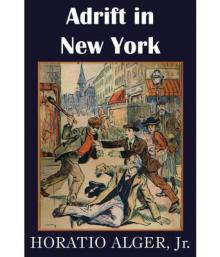 Adrift in New York: Tom and Florence Braving the World
Adrift in New York: Tom and Florence Braving the World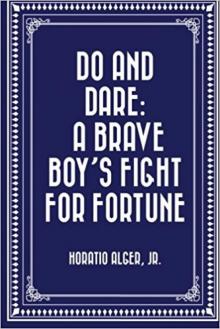 Do and Dare — a Brave Boy's Fight for Fortune
Do and Dare — a Brave Boy's Fight for Fortune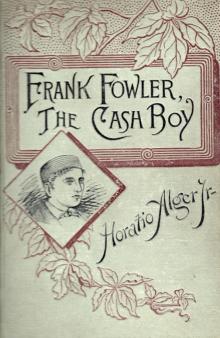 The Cash Boy
The Cash Boy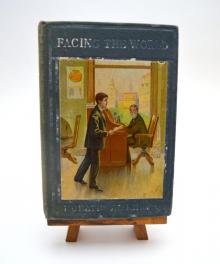 Facing the World
Facing the World The Young Explorer; Or, Claiming His Fortune
The Young Explorer; Or, Claiming His Fortune The Store Boy
The Store Boy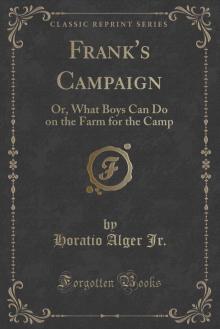 Frank's Campaign; Or, The Farm and the Camp
Frank's Campaign; Or, The Farm and the Camp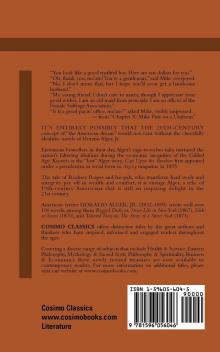 Cast Upon the Breakers
Cast Upon the Breakers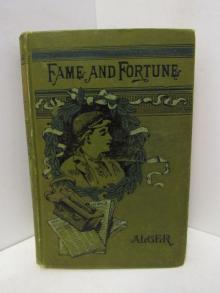 Fame and Fortune; or, The Progress of Richard Hunter
Fame and Fortune; or, The Progress of Richard Hunter The Errand Boy; Or, How Phil Brent Won Success
The Errand Boy; Or, How Phil Brent Won Success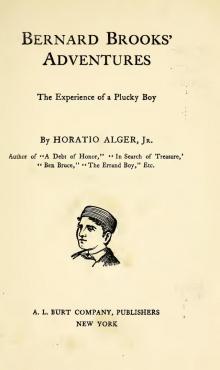 Bernard Brooks' Adventures: The Experience of a Plucky Boy
Bernard Brooks' Adventures: The Experience of a Plucky Boy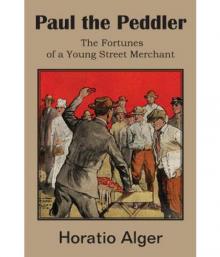 Paul the Peddler; Or, The Fortunes of a Young Street Merchant
Paul the Peddler; Or, The Fortunes of a Young Street Merchant Brave and Bold; Or, The Fortunes of Robert Rushton
Brave and Bold; Or, The Fortunes of Robert Rushton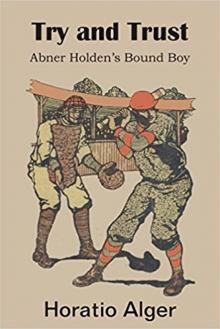 Try and Trust; Or, Abner Holden's Bound Boy
Try and Trust; Or, Abner Holden's Bound Boy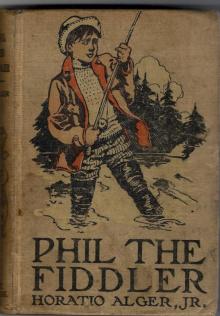 Phil, the Fiddler
Phil, the Fiddler In A New World; or, Among The Gold Fields Of Australia
In A New World; or, Among The Gold Fields Of Australia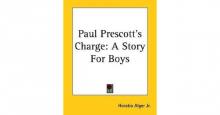 Paul Prescott's Charge
Paul Prescott's Charge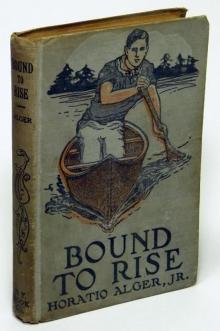 Joe's Luck; Or, Always Wide Awake
Joe's Luck; Or, Always Wide Awake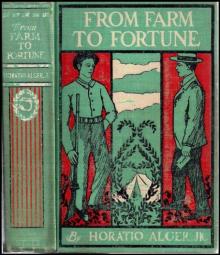 From Farm to Fortune; or, Nat Nason's Strange Experience
From Farm to Fortune; or, Nat Nason's Strange Experience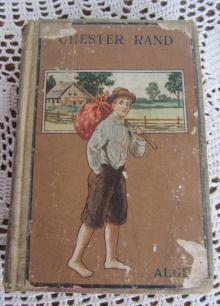 Chester Rand; or, The New Path to Fortune
Chester Rand; or, The New Path to Fortune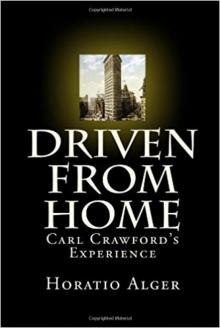 Driven from Home; Or, Carl Crawford's Experience
Driven from Home; Or, Carl Crawford's Experience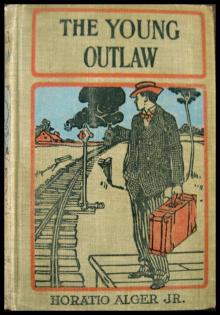 The Young Outlaw; or, Adrift in the Streets
The Young Outlaw; or, Adrift in the Streets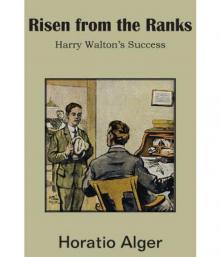 Risen from the Ranks; Or, Harry Walton's Success
Risen from the Ranks; Or, Harry Walton's Success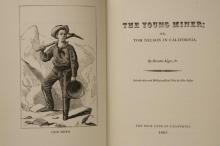 The Young Miner; Or, Tom Nelson in California
The Young Miner; Or, Tom Nelson in California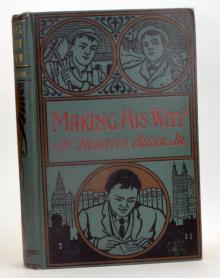 Making His Way; Or, Frank Courtney's Struggle Upward
Making His Way; Or, Frank Courtney's Struggle Upward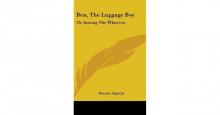 Ben, the Luggage Boy; Or, Among the Wharves
Ben, the Luggage Boy; Or, Among the Wharves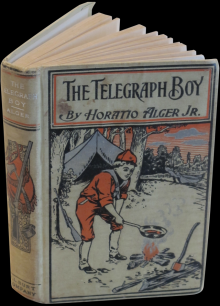 The Telegraph Boy
The Telegraph Boy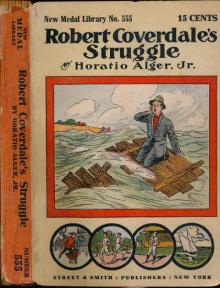 Robert Coverdale's Struggle; Or, on the Wave of Success
Robert Coverdale's Struggle; Or, on the Wave of Success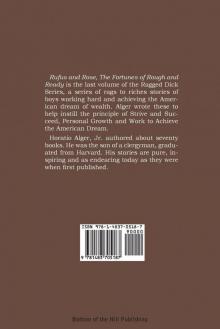 Rufus and Rose; Or, The Fortunes of Rough and Ready
Rufus and Rose; Or, The Fortunes of Rough and Ready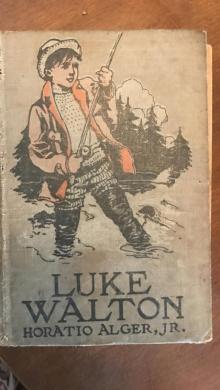 Luke Walton
Luke Walton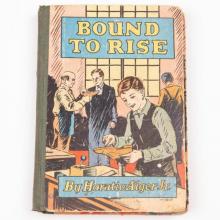 Mark Mason's Victory: The Trials and Triumphs of a Telegraph Boy
Mark Mason's Victory: The Trials and Triumphs of a Telegraph Boy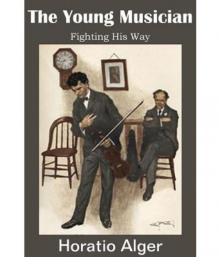 The Young Musician; Or, Fighting His Way
The Young Musician; Or, Fighting His Way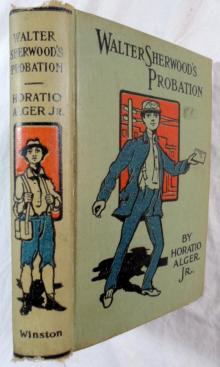 Walter Sherwood's Probation
Walter Sherwood's Probation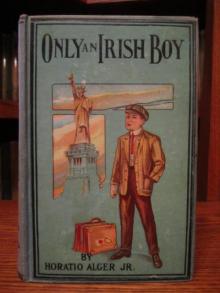 Only an Irish Boy; Or, Andy Burke's Fortunes
Only an Irish Boy; Or, Andy Burke's Fortunes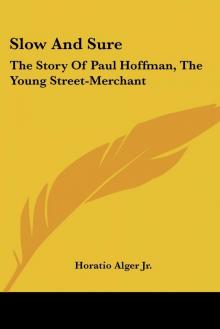 Slow and Sure: The Story of Paul Hoffman the Young Street-Merchant
Slow and Sure: The Story of Paul Hoffman the Young Street-Merchant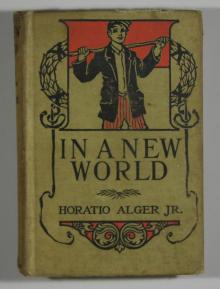 Herbert Carter's Legacy; Or, the Inventor's Son
Herbert Carter's Legacy; Or, the Inventor's Son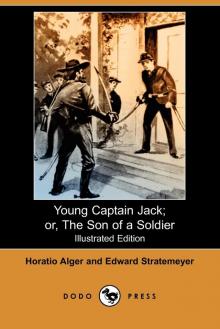 Young Captain Jack; Or, The Son of a Soldier
Young Captain Jack; Or, The Son of a Soldier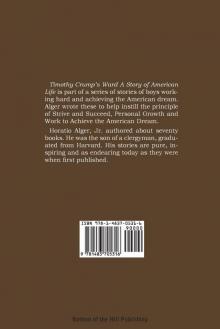 Timothy Crump's Ward: A Story of American Life
Timothy Crump's Ward: A Story of American Life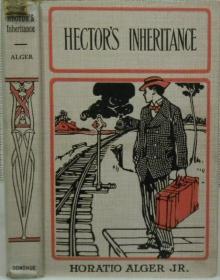 Hector's Inheritance, Or, the Boys of Smith Institute
Hector's Inheritance, Or, the Boys of Smith Institute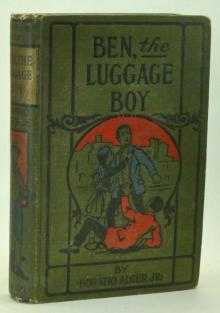 Ben's Nugget; Or, A Boy's Search For Fortune
Ben's Nugget; Or, A Boy's Search For Fortune